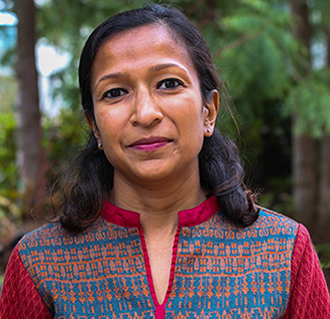GOALS
Bidisha Biswas
Department of Political Science

Institutional Goals
Listed below are selected learning outcomes in the area of critical thinking that Western Washington University is actively integrating into its curriculum. Each learning outcome is listed with its definition, along with a description of how Bidisha Biswas's teaching strategies meet each of these student learning outcome goals.
Source: Adapted from the California Academic Press's Holistic Critical Thinking Scoring Rubric (HCTSR)
| Learning Outcomes | Definition | Course Outcomes |
|---|---|---|
| Identification | Accurately identifies and interprets evidence. | All of the graded assignments in the course require students to identify and interpret evidence related to measures of political risk. |
| Alternative Consideration | Considers major alternative points of view. | The written assignments for the course require students to consider alternate perspectives based on the audience they are writing for as well on the competing analysis provided by different datasets and organizations. |
| Accurate Conclusions | Draws warranted, judicious, non-fallacious conclusions. | The written briefings, midterm exam, and final paper for this course all call for well-reasoned conclusions, based on evidence. |
| Justification | Justifies key results and procedures, and explains assumptions and reasons. |
Source: Adapted from Western Washington University's Learning Outcomes for Writing Proficiency.
| Learning Outcomes | Definition | Course Outcomes |
|---|---|---|
| Rhetorical Knowledge | Focuses on a clear rhetorical purpose and responds appropriately to the needs of varied audiences and situations. | Each written assignment specifies a target audience, which could include a not-for-profit organization, a U.S. government agency, and representatives of a non-U.S. government. Students are required to communicate in ways that are appropriate to the specified audience. |
| Critical Analysis | Develops, examines, situates, and communicates a reasoned perspective clearly to others. | All assignments, both written and verbal, focus on critical analysis and effective communication. |
| Composing Processes | Understands writing as a recursive process that involves drafting, re-thinking, editing, re-conceptualizing. | The final paper goes through two rounds of peer review and three rounds of instructor review in order emphasize writing as a process. Students also attend one or more workshops conducted by Western’s Learning Commons Writing Studio program. |
| Convention Knowledge | Uses appropriate conventions for documentation and for surface features such as syntax, grammar, usage, punctuation, and spelling. | The grading rubric for each written assignment includes points assigned for corrected language usage. I refer students who struggle with this to the Writing Studio. |
